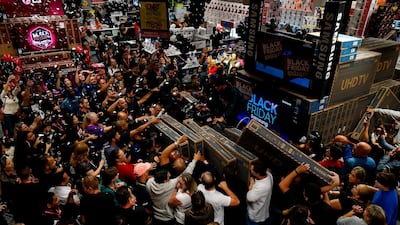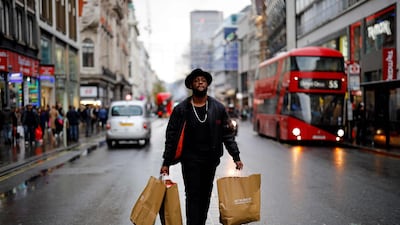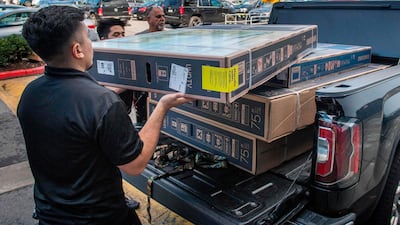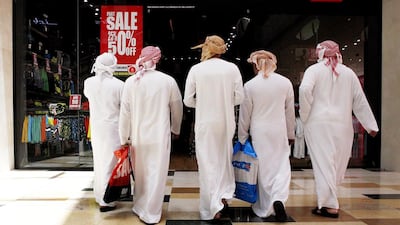There is nothing unusual about crowds gathering outside a store, waiting for it to open and Black Friday sales to begin. But the throngs of people clustered outside the Choose Love pop-up store in Covent Garden last Friday was different. They weren’t there to furnish their homes, add to their wardrobes or buy yet more unnecessary accessories. The store, which is open until Christmas Eve, gives customers the option of buying vital resources for refugees.
Dh14 buys an emergency blanket. Dh190 buys a rescue at sea. The “feel the love” package costing about Dh3,000 pays for all 27 items in the store, from winter clothing to mental health support.
The Choose Love store is a reminder that in an age of vapid consumerism, there is still an opportunity to put our money where it counts. It comes as part of a backlash against the excessive spending that epitomises this time of year. From Black Friday, the busiest shopping day of the year, to Cyber Monday and right up until Christmas, shops and malls around the world have traditionally been filled with customers frenziedly snapping up deals, from white goods to fast fashion. In the US alone, they spent a record $11.6 billion online last week over Thanksgiving and Black Friday.
But it is possible to opt out of the shopping mayhem. As well as donating money to more worthy causes, more than 300 clothing brands have formed an international collective called Make Friday Green Again, urging shoppers not to spend money in the sales. This might seem counter-productive for companies that thrive because they make money but the eco-friendly brands argue that overproduction of goods is detrimental to climate change. Collective founder Nicolas Rohr says: “Today we don’t buy what we need, we buy because we are tempted.”
In the UAE, Black Friday saw discounts of up to 90 per cent online and in stores. With a large number of people enjoying a national bank holiday until Wednesday and with time on their hands, the packed parking lots of malls are testimony to how universal this shopping trend has become.
To be honest, I myself fell foul of the lure of special deals on big-ticket items last weekend. The fridge I bought sits on my conscience, when there are dozens of similar secondhand items available. I spotted good deals on Dubizzle but the prospect of organising a truck over the weekend to have a pre-owned fridge hauled from one end of Dubai to my kitchen made me look the other less sustainable way.
I can justify that purchase because it was necessary. But if you have nothing you need to buy, why get caught in a tide of shoppers, simply to accumulate more possessions and then figure out where to store it and what to do with your existing hoard?
When sales on such massive scales manage to entice even the thriftiest of shoppers, we have to ask: has the cult of minimalism failed? What of the trend inspired by Marie Kondo, the tidying guru, whose penchant for discarding anything that doesn’t “spark joy” sees her disciples neatly compartmentalising their lives into tiny boxes?
How is it that we seem to disregard what this incessant accumulation of things does to our psyche, our savings, the environment and overflowing landfill sites? When advertisements in the real world and the oneupmanship of social media nudge you towards pointless spending, enabling a superficial culture of keeping up with the Joneses, we are left with a society that is often saddled with debt.
The only way to cope with these shopping bonanzas is to practice willpower. If you need stuff, fine. If you do not and you are simply succumbing to an urge to buy something you never considered before, stop. Give something away before you begin to hoard anew. That is the more sustainable option, not to mention a domestically harmonious one.
Some people wait for weeks or even months for Black Friday so that they can get 30 per cent off on a new high-definition television or a three-piece suit they were already looking to replace. That is a sensible decision but when you consider less durable buys such as clothes, shoes and electronics, ask yourself whether you really need a new phone after just 12 months. And let’s not even get to the recession-proof industry – make-up and the need to endlessly stock up on cosmetics.
Accumulating clothes, shoes and handbags poses a great challenge today to those championing sustainability. With the number of money-managing apps available, sensible spending should not be unattainable. If for only one day this bank holiday, switch off your phone, log off those shopping websites and talk a walk on a beach or in a park – all free pleasures that could have untold benefits for your health. And if you do have to shop, make it for a cause that has a positive impact on someone’s life.
Nivriti Butalia is an assistant comment editor at The National








